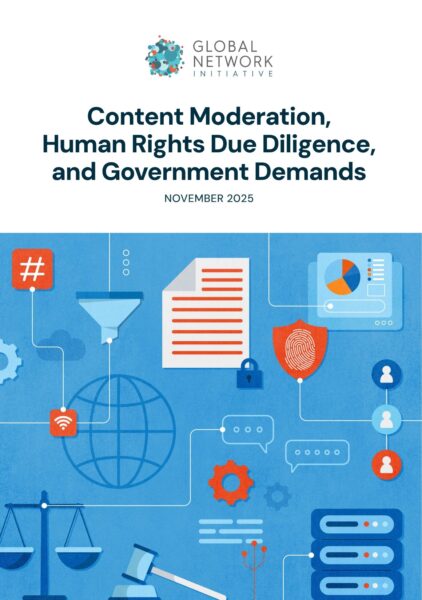 The Global Network Initiative (GNI) is pleased to announce the release of a new report on “Content Moderation, Human Rights Due Diligence, and Government Demands,” capturing the highlights and takeaways from a three-part learning series. The series aimed to deepen collective understanding of how different models of content governance can impact the rights to freedom of expression and privacy, particularly as governments around the world become more active in regulating online spaces.
The Global Network Initiative (GNI) is pleased to announce the release of a new report on “Content Moderation, Human Rights Due Diligence, and Government Demands,” capturing the highlights and takeaways from a three-part learning series. The series aimed to deepen collective understanding of how different models of content governance can impact the rights to freedom of expression and privacy, particularly as governments around the world become more active in regulating online spaces.
Read the report on “Content Moderation, Human Rights Due Diligence, and Government Demands”
Shared learning is a cornerstone of GNI’s mission. By drawing on the diverse expertise and practical experience of our member companies, civil society organizations, investors, and academics, GNI works to strengthen understanding of emerging challenges to freedom of expression and privacy in the technology ecosystem. This collaborative approach enables GNI to support responsible company practices while contributing to broader policy and rights-based conversations.
From May through October 2025, in collaboration with our Human Rights Due Diligence Working Group, GNI convened a series of three in-depth member discussions examining the pressures facing online platforms amid unprecedented levels of content generation and heightened government intervention. The series responded to a rapidly shifting environment in which governments around the world are issuing increasing numbers of requirements that shape how companies moderate content and manage user data.
Each session focused on a distinct area with significant implications for human rights:
- Session 1: Exploring Human Rights Due Diligence in Community Moderation Models
Participants explored a range of community-driven and platform-based moderation models, examining how government restrictions and demands may influence these systems and affect the rights to freedom of expression and privacy. The session also addressed the role of human rights due diligence in navigating these pressures. - Session 2: Hash Databases, Due Diligence, and the Boundaries of Government Oversight
The discussion centered on how shared technical systems – such as hash databases used to detect terrorist content, child sexual abuse material, and other harmful content – operate in practice. Members examined where and how government requirements can affect privacy and expression, and identified opportunities to strengthen transparency, accountability, and safeguards through improved human rights due diligence. - Session 3: Navigating AI Moderation and the Risks to Free Expression
This session reviewed the expanding use of AI in content moderation, including automated filtering and emerging, more complex approaches. Participants considered how regulatory incentives and state interventions may inadvertently shape these technologies in ways that heighten risks to freedom of expression and privacy.
Following each call, GNI published a summary capturing key insights and areas of emerging consensus. The newly released report brings together lightly edited versions of these posts to provide a single, accessible resource for practitioners, policymakers, researchers, and others working at the intersection of technology and human rights.
GNI hopes these reflections will support ongoing efforts across sectors to identify risks, develop effective safeguards, and promote responsible human rights practices in an increasingly complex digital environment.